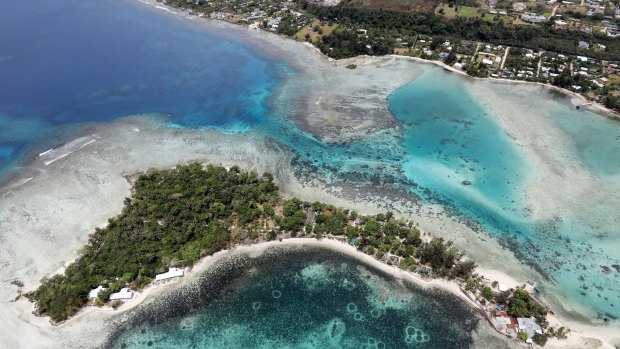Mar 28, 2023
A Climate Vulnerable Nation Takes the World to Court Over Emissions
, Bloomberg News

(Bloomberg) -- Vanuatu, one of the most vulnerable countries to global warming, is taking matters into its own hands.
After the world failed to boost targets for cutting emissions at last year’s climate summit, the Volcanic atoll in the South Pacific is turning to international law to make sure countries live up to their commitments to curb greenhouse gases.
Vanuatu, leading a core group of 18 nations, wants the International Court of Justice to issue its assessment of what countries are obliged to do in order to make sure that global temperature rise is kept below the Paris Agreement target of 1.5 degrees Celsius. While those who breach their official pledges will not be taken to court directly, the ruling would be the most authoritative legal voice on where they are falling short both in terms of emissions cuts and finance to poorer nations.
“If states don’t do what the ICJ says needs to be done, they are violating the law,” said Margaretha Wewerinke-Singh, professor of law at the University of Amsterdam and lead counsel for Vanuatu.
Vanuatu received backing from the United Nations General Assembly on Wednesday to bring the case to the ICJ. It could take up to two years for the ICJ to issue its opinion.
The legal push comes amid widespread frustration from small island states and developing nations that the world is acting too slowly when it comes to tackling global warming. It adds to growing fears that the United Nations’ Conference of the Parties — the multilateral process set up in order to fight climate change — is too beholden to fossil fuel interests and isn’t equipped to address the scale of the challenge.
The Egyptian Presidency of COP27 was criticized for not doing more to boost emissions-cutting targets, opting instead to focus on the setting up of a financial facility to cope with the losses and damages caused by climate change. Environmental groups are worried that the United Arab Emirates, the host of this year’s summit, will act as a similar brake on climate action.
“Negotiations are not working for the most vulnerable,” Ralph Regenvanu, Vanuatu’s climate minister, said in an interview. “We are really hoping that it’ll signal greater ambition from countries like the UAE, which are fossil-fuel extraction and producing countries. We need the legal clarity.”
Vanuatu’s motion comes as countries and activists are increasingly turning to legal avenues to try and speed up climate action, as well as prevent new fossil fuel facilities from being built. Another group of island states last year asked for an opinion on climate change under the United Nations Convention on the Law of the Sea, while Greta Thunberg last week received the go ahead to sue the Swedish government for insufficient climate action.
The hope for Vanuatu is that an opinion from the ICJ will help inform lawsuits based on concerns about climate change. It could also shine a light on whether projects like a mammoth ConocoPhillips oil drilling plan in northwest Alaska is in line with the US’ global climate commitments, according to Wewerinke-Singh.
“It’s advice to all UN member states, without any exceptions. States cannot make excuses,” she said in an interview.
Still, there were lingering concerns that the world’s two biggest emitters — the US and China — hadn’t publicly committed to supporting Vanuatu’s motion. The two countries have historically resisted any efforts to be held legally liable for the extreme weather events caused by climate change.
And while it’s true that some countries don’t pay as much attention to international law as others, the opinion is still expected to raise pressure on all nations to do more under global commitments such as the landmark climate agreement reached in Paris in 2015.“The Paris Agreement needs a boost,” said Wewerinke-Singh. ““It would be suicidal to say we can do without” institutions such as the annual climate change talks — known as COP — held annually to build on the deal.
Vanuatu, meanwhile, has shown that it can punch well above its weight when it comes to climate diplomacy. In 1991, it led calls to set up a loss and damage facility, something that would only reach fruition more than 30 years later, and was the founder of the Alliance of Small Island States, a powerful negotiating bloc in climate talks.
Its influence though is no quirk of fate, but rather because it has no other choice. The country was ranked the world’s most at-risk for natural hazards by the UN. The bulk of which have been made worse from climate change. Earlier this month, two category-four cyclones hit the island within the span of 72 hours.
The push to get an advisory opinion from the ICJ originated from a group of Pacific island law students in 2019, before spiraling into the more than 100 backers today. The aim is to draw on legal obligations across international agreements, not just the Paris Agreement, but also maritime rules and human rights covenants.
This gives clarification on the “obligations of all states, including all major emitters past president and future,” said Kristin Tilley, climate ambassador for Australia, which is co-sponsoring the resolution and is aiming to host COP31 alongside island states. “Very clearly Pacific Island leaders are seeing this initiative as driving global momentum towards 1.5 degrees.”
(Adds update on UN General Assembly backing Vanuatu’s resolution)
©2023 Bloomberg L.P.


